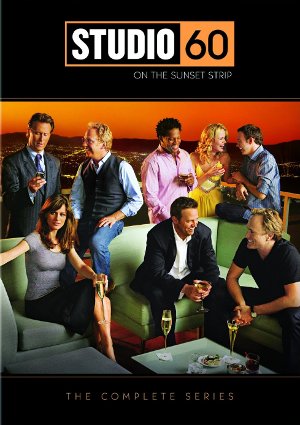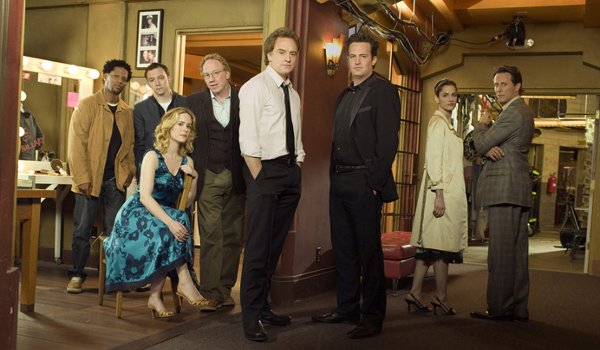- Title: Studio 60 on the Sunset Strip
- tv.com: link

“Well, your side hates my side because you think we think you’re stupid, and my side hates your side because we think you’re stupid.”
 In many ways Studio 60 on the Sunset Strip was Aaron Sorkin‘s most ambitious project to date. Returning to the show within a show concept he used to craft Sports Night (read that review) Sorkin also brought in weighty issues to balance against the behind the scenes sketch comedy. The merging of the two doesn’t always work in every scene, but every single episode contains some magic and something not just to enjoy but to savor and discuss as well.
In many ways Studio 60 on the Sunset Strip was Aaron Sorkin‘s most ambitious project to date. Returning to the show within a show concept he used to craft Sports Night (read that review) Sorkin also brought in weighty issues to balance against the behind the scenes sketch comedy. The merging of the two doesn’t always work in every scene, but every single episode contains some magic and something not just to enjoy but to savor and discuss as well.
Studio 60 takes place behind the scenes of a late night sketch comedy similar to SNL. After the producer and creator of the show Wes Mendell (guest star Judd Hirsch) loses a final battle against Standards and Practices and interrupts a live feed to rant against the state of television (watch that clip). The new head of programming for NBS (the National Broadcasting System) Jordan McDeere (Amanda Peet) brings in two of the show’s most popular alumns, Danny Tripp (Bradley Whitford) and Matt Albe (Matthew Perry) to produce and write the show.
The show doesn’t back down from issues nor does it hide from discussion of issues without a clear-cut answer. Matt still loves Harriet “Harry” Hayes (Sarah Paulson) even though their views on religion leave them light years apart: “She believes the world was created in six days. And that’s not even among the top three reasons we’re not together” (check out this clip). Like many of the arguments and discussions in real life the issue is never really resolved as the two must finally accept how each of them sees the world differently and learn to respect those differences. That’s some heavy lifting for a comedy show! And what makes Studio 60 it work, much like The West Wing (read that review), is as it makes its point it never feels like work or a lecture, but simply smart and well thought-out entertainment.
The show deals with some weighty issues including politics, religion, gay marriage, the rebuilding of New Orleans, the blacklist, but it’s really a show about relationships and characters. Matt and Harriet’s combustible relationship is complicated but the love between them is so simple. Danny and Matt’s friendship, from the Pilot on, is fun to watch and feels quite real, as is Danny’s wooing of Jordan. Add in strong supporting performances from D.L. Hughley, Steven Weber, Nathan Cordry, Timothy Busfield, Nate Torrence, and recurring roles for Lucy Davis, Camille Chen, Simon Helberg, Ayda Field, Merritt Wever, Columbus Short, Mark McKinney, Ed Asner and so many more, and you’ve got more than enough ingredients to blend together in new and interesting ways each week.
Fans of quick laughs and instant gratification may find Studio 60 not quite to their liking. It’s a intelligent show that although is quick paced with snappy dialogue (a Sorkin trademark) it takes a viewer with a certain level of patience to let the dramedy unfold.
Although widely acclaimed when it premiered (rated #6 and #2 on Series of the Year lists for the NY Daily News and The Miami Herald, and a 75/100 score on Metacritic) the show gradually lost viewers and many critics, feeling the tide turning, flip-flopped their stance on the show (Time and Entertainment Weekly called it a “bust” and “the worst TV show of 2006” respectively). Even though the show did continue to score strongly with its major demographic it was canceled after one season, despite earning several award nominations including five Emmy’s – the same number as CSI and 24 (John Goodman won for his guest-role in “Nevada Day”), Writers and Directors Guild nominations, a Golden Globe nomination, four Satellite Award nominations, and more.

The verdict seemed to be in, the show was simply too smart for TV. A common criticism of the show was their wasn’t enough sketch comedy or the sketch comedy bits seen weren’t that funny. I think that has more to say about Sorkin’s view of late-night television than quality of the writing (I would say these bits were funny as much or more of the time than those of SNL). Some, who are fans of such shows, were also angered by the show’s attitude to “illeterate programming” such as “reality-TV,” which the show had no trouble pointing out the faults of such lowbrow unimaginative bottom of the barrel programming (not an issue for me, KUDOS!!!!, but sadly cutting a little too close to home for many casual viewers).
Saying Studio 60 is Sorkin’s least effective work is like saying Eyes Wide Shut is Stanley Kubrick‘s weakest film. Is it? Yes, but that doesn’t mean it isn’t better than 95% or more of other TV or movies by less talented creators which it can be compared to. In terms of raising the bar of television Sorkin did his job, and did it well, once again. It’s a show about television, about culture, about people and relationships, told with style. With its lack of extras it may not be a must-have DVD set to buy, but it’s smart television (an endangered species these days) and a worthy show to add to any collection.

Comments are closed.